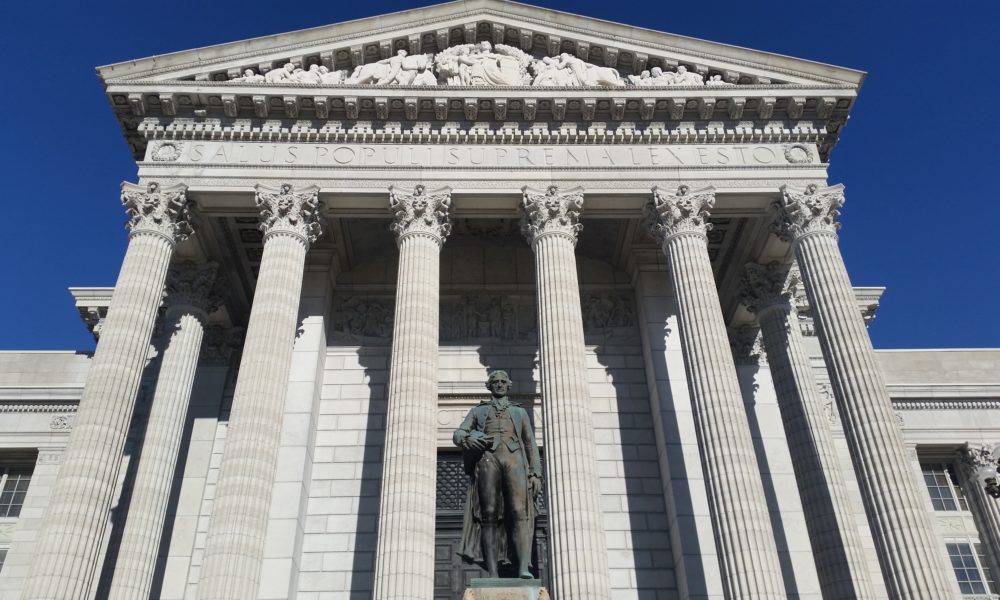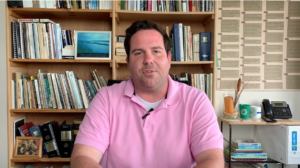MCE’s 2019 Legislative Debrief Includes:
- Priorities
- Allies
- Outcomes
Legislative Priorities
MCE has engaged the state legislature over the last 50 years because lawmakers have a significant amount of influence on issues we value, like clean water, healthy food access, public land, and much more. In 2019, MCE started the session with these five top priorities:
- support environmentally responsible action to address the increased frequency and intensity of floods,
- preserve the option of Missouri counties to determine how close a concentrated animal feeding operation (CAFO) or factory farm can be located to neighboring properties,
- protect food access for adults and children enrolled in the Supplemental Nutrition Assistance Program (SNAP),
- oppose legislation that bans local governments from placing bans or increasing taxes on single-use items like plastic straws, plastic bags, and Styrofoam, and
- oppose efforts to change the initiative petition process or change components of Missouri Constitutional Amendment No. 1 in 2018, known as CLEAN Missouri.
The legislative session requires groups like MCE to adapt as it progresses. Sometimes bills are introduced a month or two after the session begins that require our attention. Sometimes bills that wouldn’t be a priority become priorities after they are amended, most often with unpopular ideas we oppose that did not get time on the House or Senate floor to be debated on their own merit. Some of our top priorities that were in response to legislative action included:
- oppose the sale of the newly acquired Eleven Point State Park,
- oppose the overcriminalization of nonviolent civil disobedience at so-called “critical infrastructure facilities,” most of which are fossil fuel and extractive industries (This also contained conspiracy language that would fine organizations that assisted in such activities.),
- oppose the elimination of the regional automobile tailpipe emissions program in the City of St. Louis, St. Louis County, St. Charles County, and Franklin County,
- oppose the crippling of Missouri’s Department of Natural Resources (DNR) by allowing pollution permit applicants to reduce pollution fees if it requires third-party assistance in the submission of its pollution permit(DNR’s budget is funded mostly through pollution permit fees, totally $8,613,928.53 in 2019.), and
- support the construction of the Grain Belt wind energy transmission line. The project will increase wind energy delivered to Missouri, create jobs, and save thousands of Missourians millions of dollars.
MCE Allies
MCE worked with a variety of allies on our legislative priorities this session, including but not limited to Operation Food Search, KC Healthy Kids, Missouri Sierra Club, Missouri Rural Crisis Center, American Heart Association, Missouri Farmers Union, and Empower Missouri.
MCE either led or supported 4 lobby days this legislative session. We led the Good Food Lobby Day with food access and family farmer organizations on February 6th. More than 40 citizen lobbyists visited every senate office and twenty-one house offices.
Outcomes for MCE Top Priorities
The Good
- MCE helped stop more than 50,000 children and 40,000 adults from losing the Supplemental Nutrition Assistance Program (SNAP) benefits. Bills that would have reduced SNAP benefits include SB 4 (Sen. Sater, R-Cassville), HB 474 (Rep. Eggleston, R-Maysville) and HB 375 (Rep. Kelly, R-Mountain Grove).
- We helped stop the sale of the Eleven Point State Park. House Bill 1237, which started as a noncontroversial bill to convey certain state properties, was amended on the floor of the House of Representatives to sell the Eleven Point State Park. MCE and allies testified against this part of the bill during the Senate General Laws committee hearing and members of the committee removed the sale of the park language unanimously before passing it out of committee. Rep. Pogue’s (R-Salem) bills that would sell the Eleven Point State Park, both of which never received a hearing in a House committee, are HB 766 & HB 777.
- We helped stop legislative attacks on the Grain Belt Express wind energy transmission project that was unanimously approved by the Public Service Commission on March 20th. HB 1062 (Rep. Hansen, R-Frankford) would have stopped the project.
- The initiative petition process was preserved and efforts to change CLEAN Missouri and send it back to the votes before what voters just approved in 2018 could be implemented were stopped. About a dozen house bills were introduced to make it harder for citizens to utilize the initiative petition process. SB 5 and SJR 1 (Sen. Sater, R-Cassville) posed the most serious threat in the Senate. HJR 46 (Rep. Christofanelli, R-St. Peters), HJR 47 (Rep. Trent, R-Springfield), and HJR 48 (Rep. Plocher, R-St. Louis) were combined and ultimately defeated in a Senate committee on a tie vote 2-2.
- We stopped the elimination of the automobile air emissions program for the St. Louis region even though the region is in nonattainment for ozone. Elimination of the program would have increased the number of orange and red air quality days in the region, negatively impacting public health, especially for people with asthma and other respiratory problems. Senator Eigel (R-St. Charles) introduced SB 359, which never came up for debate on the floor as a standalone bill, and Senator Schatz (R-Sullivan) amended the bill language in SB 359 into HB 499 in the last two weeks of session in order to try and get it passed.
- Missouri already has a law that bans local communities from banning plastic bags. Rep. Dan Shaul, who was able to get the local bans on bans passed previously, sponsored HB 271, which would have banned local bans or tax increases on single-use items like plastic straws, plastic bags, and Styrofoam. Thankfully this bill never made it out of the House of Representatives.
- House Bill 1158, introduced by Rep. Pietzman (R-Troy), would have required the Missouri Department of Natural Resources (DNR) to assist pollution permit applicants throughout the entire permitting process passed the House of Representatives but never received a hearing in the Senate. The bill would have allowed the pollution permit applicant to deduct the cost of utilizing a third party for assistance on its permit application from the fees it owed the DNR for the ability to pollute our air, water, or land. This bill could jeopardize $8,613,928.53 in DNR funding that is collected from pollution permit fees.
The In-between
- The “pipeline protest” language passed, however, we were able to water it down significantly, including removal of the organizational conspiracy language, decreasing penalties for certain crimes, and eliminating increased penalties for certain crimes (like spray painting a pipeline, which could have been a Class C felony). The bill was originally filed by Sen. Hough (R-Springfield) as SB 293 with the final language being amended and passed on HB 355, a bill originally related to utilities.
- The Senate restored funding previously removed from the historic preservation tax credit program (the good), which helps fund historic sites that are part of our state parks system. The Senate conceded its position in conference committee to the House and the money was removed, about $500k (the bad).
The Bad
- The ban on local control for CAFOs passed following more than 15 hours of debate on the Senate floor. The bill was originally debated for three hours and laid over. It was brought back up on a Monday evening with a few weeks left in session and filibustered for more than 12 hours. The bill was amended to include a Joint Committee on Agriculture, increased notification for neighboring properties if a landowner wants to build a CAFO, bans construction of a CAFO until an operating permit is acquired, and creates buffers for the application of liquid animal waste on farm fields with varying setbacks for neighboring properties and water sources like rivers, lakes, and drinking water wells. Amendments that the bill sponsor and the large industrial agriculture lobbyists opposed included allowing a local vote to retain local control, restoring the public majority on the Clean Water Commission, and banning the foreign ownership of Missouri’s agriculture land and requiring currently foreign owned land to be sold back to Americans. Senator Bernskoetter (R-Jefferson City) is the sponsor of Senate Bill 391.
We supported two efforts that would have given Missouri more tools to fight the increasing frequency and intensity of floods. Senator Koenig (R-St. Louis) amended his own legislation, Senate Bill 108, related to tax increment financing (TIF) to include banning TIF for projects developed in a floodplain. It is hard to believe this was not considered following the great flood of 1993. The bill unanimously passed the Senate following an exemption for four counties and was further weakened in committee in the House of Representatives, where it was carried by Rep. Coleman (R-Arnold). The bill did not make it to the House floor for debate, however, it went a long way for a significant policy change introduced in its first year. Rep. Coleman also sponsored legislation, HB 699, that would have allowed local governments to decrease levee heights for levees built in the 100-year floodplain. The bill received a hearing but never a vote in committee.
Click here to watch MCE’s 2019 Missouri Legislative Debrief video today:


